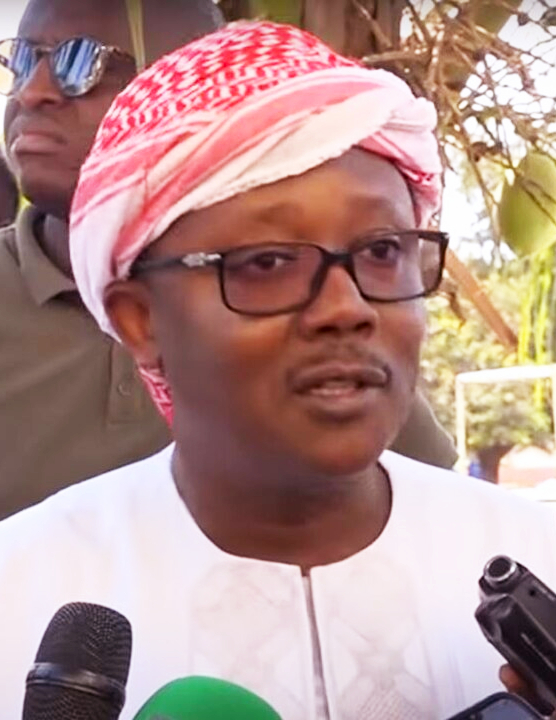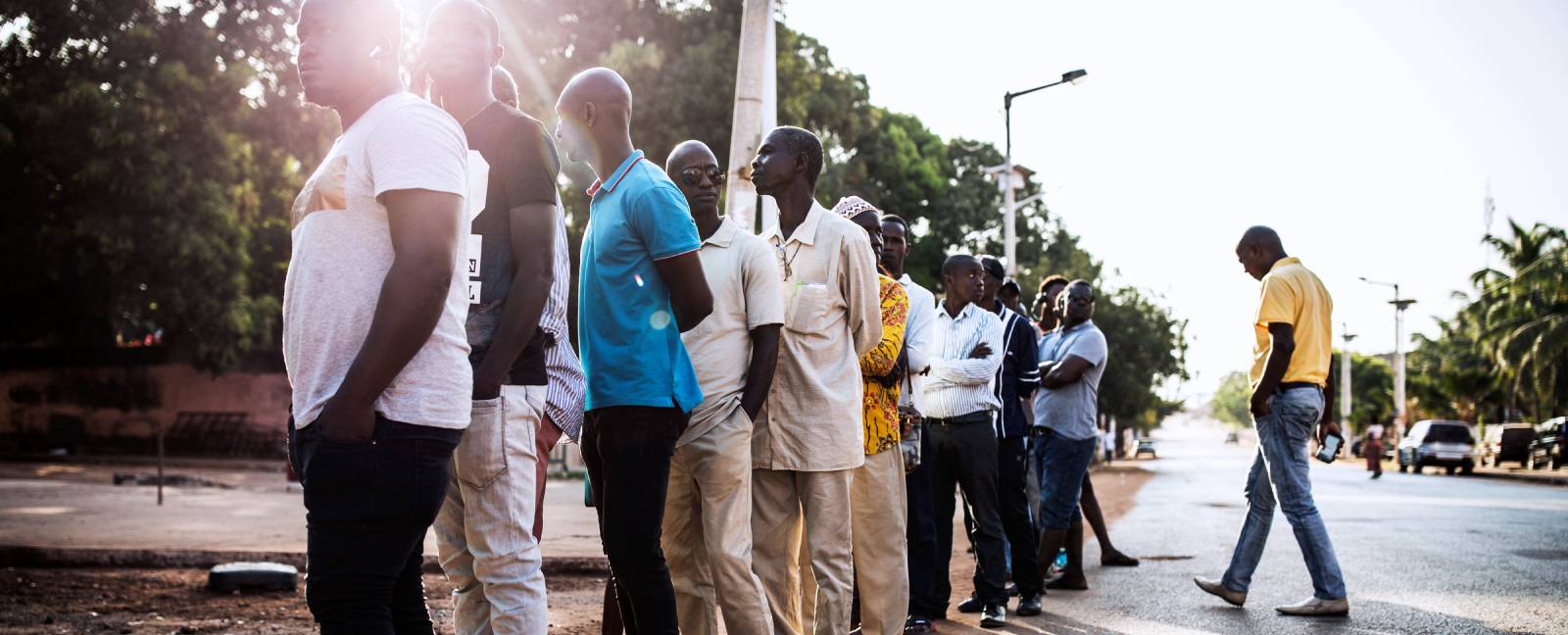« Previous: Tanzania (October)
Presidential Elections
November 30
Guinea-Bissau electoral environment in 2025 is marked by turmoil and uncertainty—a familiar place for this West African coastal country of 2 million people that has long skidded from one crisis to the next.
Guinea-Bissau was scheduled to go to the polls in December 2024, however, on November 4, President Umaro Sissoco Embaló postponed the elections. The justifications for the delay have been marked by opacity and are being challenged by the opposition as unconstitutional, perpetuating much uncertainty as to when both legislative and presidential elections will be held.

President Úmaro Sissoco Embaló. (Photo: DakarActu TV)
Some observers claim Embaló’s electoral mandate ends on February 27, 2025, and that elections need to be held before then. Embaló contends his term ends in September and that presidential elections can be held in November. It appears that Embaló may be angling to have legislative elections held prior to the presidential polls, in the hopes of regaining a majority that could help him prevail in a presidential contest later in the year.
At the heart of Guinea-Bissau’s governance dysfunction are competing visions of the role of the executive in Guinea-Bissau’s semi-presidential system. Under this arrangement, the president serves as the head of state and the prime minister, selected by parliament, is the head of government—choosing ministers and setting the day-to-day agenda. This system was adopted in the 1993 Constitution to strengthen the separation of powers between the executive, parliament, and judiciary. This was a response to the 19-year rule of President João Bernardo Vieira, who concentrated authority within the executive, facilitating abuses of power and impunity.
Speaker of Parliament Domingos Simões Pereira and his Plataforma Aliança Inclusiva–Terra Ranka (PAI-TR)—a coalition of small parties partnering with the liberation party stalwart, Partido Africano da Independência da Guiné e Cabo Verde (PAIGC)—put forward constitutional reforms in the June 2023 legislative elections to clarify the powers between the president and prime minister and limit turf rivalries between the two roles. Embaló, a product of the old state-centric presidential system that is close to the military, was instead hoping to secure a parliamentary majority to push through his revanchist vision of presidential power in a new constitution.
PAI-TR emerged victorious with a 54-48 majority in Parliament. The coalition also has the support of another 12 members of parliament (MP) from aligned parties. The result effectively limited Embaló’s expansive view of the presidential authority.
Embaló has responded to this parliamentary setback by creating a shadow cabinet of “presidential advisors,” comprised of former ministers and security officials with close ties to the military and police. Embaló has also attempted to negate legislative authority by dissolving Parliament twice (including in December 2023) alleging coup attempts, and dismissing the parliamentary-selected prime minister, Geraldo Martins. The opposition has been blocked from organizing rallies while parties aligned with Embaló’s have been free to assemble.
The effect Embaló’s actions has been to perpetuate government paralysis.
The effect of these actions has been to perpetuate government paralysis. While Parliament has officially resumed as of September 2024, MPs have been prevented from entering the National Assembly, effectively keeping it shuttered—an outcome Pereira has called a constitutional coup.
Embaló’s postponing the 2024 presidential elections follows a pattern of Embaló jettisoning established institutional processes in the effort to create alternative mechanisms that prolong his time in power and enable his expansive interpretation of executive authority.
The election confusion builds on a long pattern of instability in Guinea-Bissau.
Guinea-Bissau has experienced four coups and more than a dozen attempted coups while enduring 23 years of direct or military government since independence from Portugal in 1973. There have similarly been reports of gunfire and rumors of coup attempts in the country’s capital, Bissau, since Embaló’s November postponement of the 2024 elections.
A former brigadier general in the national army, Embaló ran as the head of the Movimento para Alternância Democrática, Grupo dos 15 (Madem G15)—a breakaway party from PAIGC—during the 2019 presidential elections. He claimed 53.5 percent of the vote versus Pereira’s 46.5 percent in disputed results.
Governmental authority in Guinea-Bissau often equates to control of patronage. This runs the gamut of narcotics trafficking, illegal logging, control of procurement contracts, and diversion of tax revenues. Guinea-Bissau has long been viewed as the prime cocaine trafficking hub in West Africa for Latin American drug cartels, and indications are that narcotics smuggling has increased under Embaló. Guinea-Bissau is ranked 158 out of 180 countries in the world on Transparency International’s Corruption Perceptions Index.
This legacy of patronage has been deeply intertwined with the security services.
This legacy of patronage has been deeply intertwined with the security services. The military and police have historically been used by political leaders to protect their political interests. This politicization has, in turn, incentivized military leaders to use their official positions to pursue their financial interests and, at times, mount coups against their political masters—another driver in Guinea-Bissau’s volatility.
Guinea-Bissau’s persistent instability has impacted the quality of life for its citizens. Roughly two-thirds of the country lives below the poverty line and, with an infant mortality rate of 50 deaths per every 1,000 live births, the country lags behind the continent on many development measures. Improving health and education services were a key part of the PAI-TR’s winning campaign platform in the 2023 legislative elections and will likely feature centrally in the 2025 presidential elections as well.
The 2025 vote, therefore, has significant implications for not only the policy priorities of Guinea-Bissau but also for its model of government and system of checks and balances.

People wait outside a polling station in Bissau early on November 24, 2019, as part of the presidential election in Guinea-Bissau. (Photo: AFP)
Despite its long legacy of political instability, Guinea-Bissau also has a track record of relatively competitive elections and alternations of power. This owes, in part, to the professional composition of the National Electoral Commission (NEC). The NEC Executive Secretariat is comprised of magistrates nominated from the Superior Council of the Judiciary and elected by two-thirds of Parliament for a 4-year term. The dissolutions of Parliament, however, have prevented the filling of vacant posts within the Executive Secretariat, adding further uncertainty to election preparations. A similar predicament prevents the Supreme Court from achieving the quorum needed to validate candidacies.
Guinea-Bissau’s resilient civil society has been a glue that helps the country weather the many bouts of political storms that it faces. This includes violent attacks against journalists who criticize the government. Despite the numerous setbacks, civil society actors continue to push for reforms that would institutionalize more transparency and oversight of public funds and public policymaking so that it serves citizen interests.
The active role of civil society in the 2025 elections will be a critical feature for a credible outcome.
Guinea-Bissau has also benefited over the years from active regional and international engagements. The Economic Community of West African States led by Senegal, the Community of Portuguese Language Countries, the European Union, Portugal, France, and the International Monetary Fund have all sustained engagements to help stabilize Guinea-Bissau. Among other initiatives, this has entailed the deployment of extended peace operations, financial support, and serving as third-party negotiators.
Aside from questions of if and when legislative and presidential elections take place, the bigger electoral story in Guinea-Bissau in 2025 will be about how to build and sustain momentum for a stable system of government and institutional guardrails against the abuse of executive power.
Hany Wahila is a Research Assistant with the Africa Center for Strategic Studies.
Previous
« Tanzania (October)


 Guinea-Bissau: Continued Turbulence in Struggle to Restrain Executive Power
Guinea-Bissau: Continued Turbulence in Struggle to Restrain Executive Power